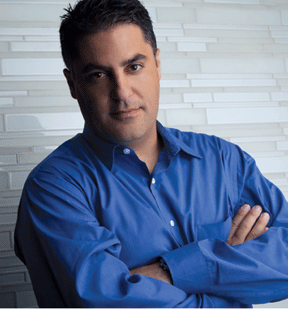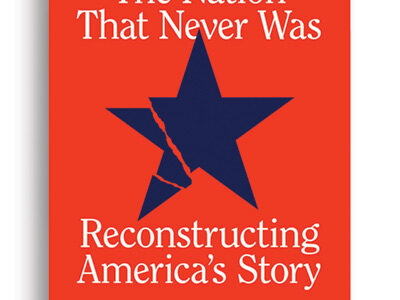
Class of ’92 | The fact that Cenk Uygur W’92 decided to call his online talk show The Young Turks has more to do with his worldview than the country from which he emigrated at the age of eight—even if the name does play off a certain reform movement in the late Ottoman Empire.
“We selected The Young Turksbecause it means young rebels looking to overthrow the established system,” says Uygur. “That’s what we fancy ourselves. People, of course, are sometimes skeptical about that—‘Aah, yeah, what kind of rebels are you?’ But let’s think about the context we were in …”
That context would be the political climate in 2002, when Uygur and a few colleagues started The Young Turks as a Sirius Satellite Radio show. Back then, at the height of post-9/11 fervor, questioning the Bush administration was considered heresy, and some commentators who spoke out against the invasion of Iraq were fired. Uygur openly declared that the war was “insane.”
“To go out and say, ‘No, we’re going to do a whole new progressive radio show in the country’—well, yeah, that makes you a bit of a rebel,” he explains. “And to say, ‘We’re going to do it on satellite radio and be the first original show instead of relying on the old radio model,’ that makes you a bit of a rebel.”
In 2005, having raised money from family and friends to purchase cameras, Uygur and his TYT colleagues—Ana Kasparian, Jayar Jackson, Jesus Godoy, and Dave Koller—began filming in his living room and broadcasting on the Internet. Since then TYT, which delivers heated video debates with political figures such as Speaker of the House Nancy Pelosi and lively discussions with actors such as Mel Brooks, has been seen by more than 250 million YouTube viewers and 9,000 subscribers. The show streams live on TYT’s website (theyoungturks.com) five nights a week for several hours, attracting 13 million views a month. Visitors can check out podcasts of the show as well as movie reviews on “What the Flick?!” with original TYT co-host Ben Mankiewicz (who now hosts Turner Classic Movies).
But the heart of TYT is politics. During his formative years in New Brunswick, New Jersey, Uygur was a Republican. He has since evolved into an anti-Republican, which is not the same as pro-Democrat. His views began to change with political developments, he notes, and the “straw that broke the camel’s back” was the invasion of Iraq.
“A policy of preemptive strikes is the exact opposite of the New World Order policy George H.W. Bush set during the first Gulf War, where no country could unilaterally attack another sovereign state,” Uygur says. “It’s maddening that no one acknowledges this. What does it mean to be a Republican, when the last two Republican presidents—with the same name—have the exact opposite foreign policy?
“Then, the Republicans just kept getting worse and worse with torture [and] warrantless wiretapping. I thought conservatives claimed to care about our constitutional rights and too much governmental power and out-of-control deficit spending. Now, you can set your watch to the GOP; take any side they’re on, and it’s a near-guarantee that it’s the wrong side.”
Which does not mean that he always takes the side of President Obama.
“He’s not doing enough, and you have to be honest,” says Uygur. “For me, I couldn’t care less if someone is a Democrat or a Republican. I have enormous disdain for the Republican Party. It doesn’t mean I’m neutral; I hate the fake ‘neutrality’ of the mainstream press. But it does mean that I’m not going to protect the Democrats.”
As a Wharton undergraduate, Uygur studied political science and entrepreneurial management before going on to earn a law degree from Columbia Law School. After a stint working at the Washington office of Drinker, Biddle & Reath, he moved to New York and worked as an entertainment lawyer for Parcher, Hayes & Liebman.
“Life took twists and turns that were unimaginable—the first one being that I became a talk-show host,” says Uygur. “But when I worked on political campaigns briefly, I was intensely uninterested. So I wanted an outlet to express my opinions but without the drudgery of going through the political campaigns. A friend of mine suggested that I take a course on how to start your own TV show [at the Learning Annex in New York], which I found to be absurd. But I gave it a shot anyway.”
Having broken into radio in 1996 as a weekend/fill-in talk-show host on WRKO in Boston, Uygur landed a similar gig at WWRC in Washington later that year. The name of his show there was The Young Turk, and the format was similar to TYT’s current mix of politics, news, and pop culture.
“The minute that I did my own show, I knew that was what I wanted to do for my life,” he says. “The rest of it was incredibly hard work to try to set up exactly the show that I wanted, with the audience that I sought out, and the platforms and the mediums that were going to bring us to the most amount of people. As long as you know what your goal is—I don’t want to say that it gets easier, but at least you know where you’re going. So the road gets more bearable.”
In 1999, Uygur wrote for and did commentary with Mankiewicz on The Times, an irreverent news show on Miami’s WAMI-TV. Then Uygur and Mankiewicz began thinking about doing their own show together, and in 2002, Uygur went to Los Angeles and secured a three-year slot for TYT as the first original talk show on Sirius Satellite Radio.
While TYT doesn’t claim to have a monopoly on the truth, it does offer honest viewpoints. He explains, for example, that because Entertainment Hollywood needs access to celebrities, a flattering report is the only option.
“Now, I think CNN and most of the major—certainly television and media—outlets do the same for politicians,” Uygur says. “So they can’t say Max Baucus [Democratic US Senator from Montana] or Jon Kyl [Republican US Senator from Arizona and current Senate Minority Whip] is not honest in his opinions; he doesn’t have any opinions. He’s just trying to figure out how to collect more money from lobbyists to get re-elected. So they will never say that when it’s 90 percent true. The whole thing is a sham. Our priority is trying to deliver the real news to our audience.”
Uygur relishes hate mail, and finds the arguments both comical and “easy to beat,” he says. “If people copy us, that only makes us stronger. If people attack us, that only makes us stronger.”
—Andrea K. Hammer




